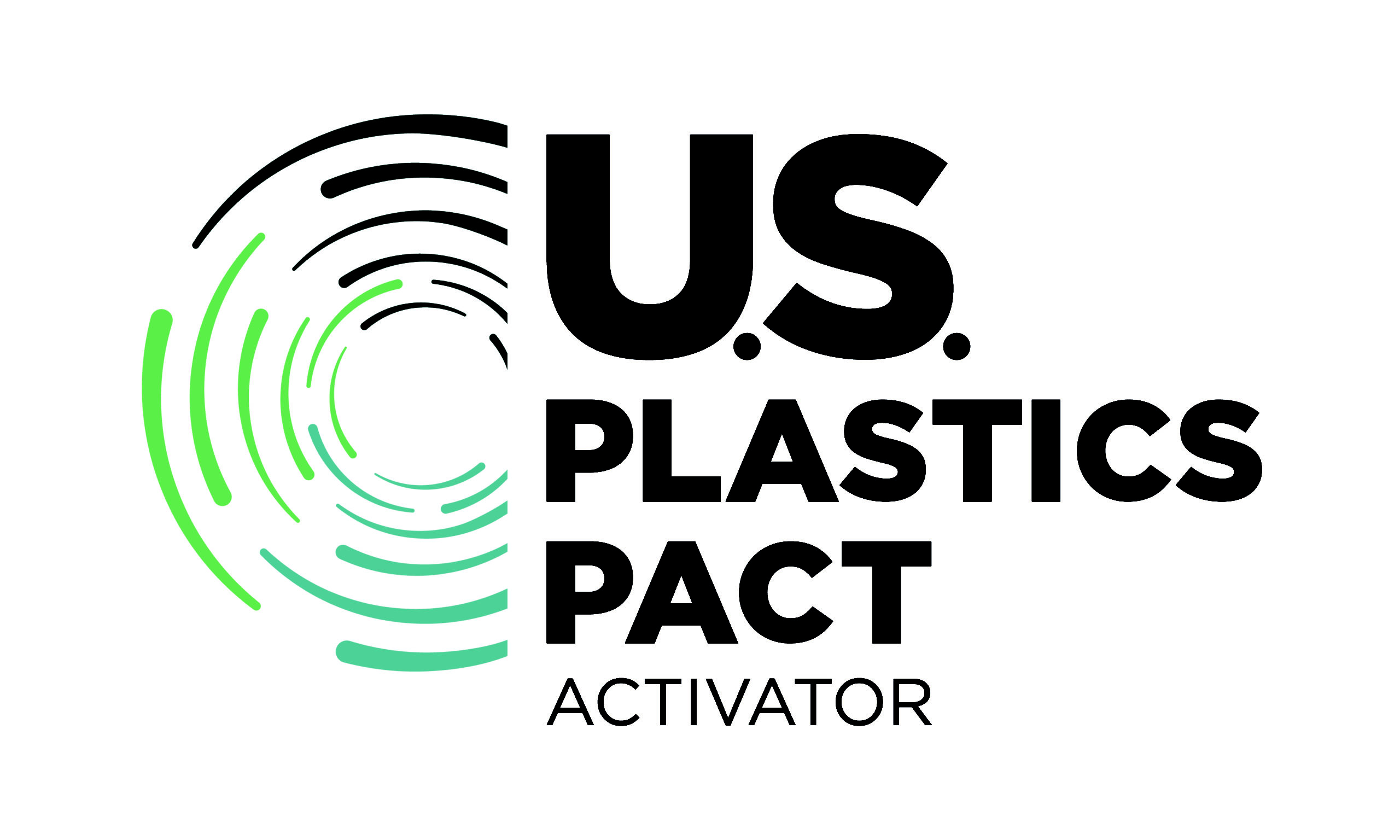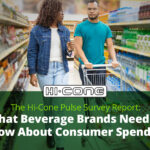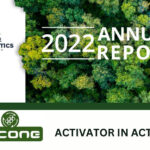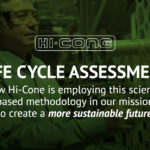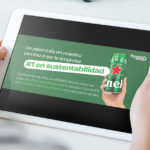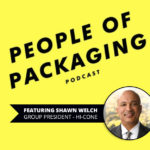Led by The Recycling Partnership and World Wildlife Fund in partnership with the Ellen MacArthur Foundation, the U.S. Plastics Pact will unify approaches to rethink the way we design, use, and reuse plastics
ITASCA, IL, (OCTOBER 26, 2020) – Today, Hi-Cone Worldwide has joined the U.S. Plastics Pact, a collaborative, solutions-driven initiative rooted in four ambitious goals intended to drive significant systems change by unifying diverse cross-sector approaches, setting a national strategy, and creating scalable solutions to create a path forward toward a circular economy for plastics in the United States by 2025. The first North American Pact of its kind, the U.S. Pact is a collaboration led by The Recycling Partnership, World Wildlife Fund (WWF), and Ellen MacArthur Foundation.
As part of the U.S. Pact, Hi-Cone recognizes that significant, systemwide change is imperative to realize a circular economy for plastics. As such, the U.S. Pact will convene more than 70 brands, retailers, NGOs, and government agencies across the plastics value chain to bring one voice to U.S. packaging through coordinated initiatives and innovative solutions for rethinking products, packaging, and business models.
“Hi-Cone joining the U.S. Plastics Pact is further evidence of our commitment to creating a circular plastics economy and ensuring this material doesn’t become waste,” said Shawn Welch, Vice President and General Manager of Hi-Cone Worldwide. “The U.S. Pact is creating substantive change regarding how our country deals with plastic, and Hi-Cone is eager to advance this fundamental shift in the packaging industry.”
As an Activator of the U.S. Plastics Pact, Hi-Cone has agreed to collectively deliver against these four ambitious goals:
- Define a list of packaging to be designated as problematic or unnecessary by 2021 and take measures to eliminate them by 2025.
- By 2025, all plastic packaging is 100% reusable, recyclable, or compostable.
- By 2025, undertake ambitious actions to effectively recycle or compost 50% of plastic packaging.
- By 2025, the average recycled content or responsibly sourced bio-based content in plastic packaging will be 30%.
Hi-Cone has already begun transforming its multipack packaging portfolio to RingCycles™, a 50%+ post-consumer recycled solution that eliminates more than 25 million pounds of virgin plastic per year with a much lower environmental impact. The company is also on target to provide a packaging solution that is 100% recyclable, compostable or biodegradable by 2025.
While the U.S. Pact is complementary to, and follows the ambitious precedents set by the existing global network of Plastic Pacts, it will be tailored to meet the unique needs and challenges of the U.S. market. The Pact will reflect national priorities and realities, while still propelling the nation closer to other developed nations in its management of plastic waste.
“Together through the U.S. Plastics Pact, we will ignite systems change to accelerate progress toward a circular economy,” says Emily Tipaldo, Executive Director for the U.S. Plastics Pact. “The U.S. Pact will accelerate system-wide change by inspiring and supporting upstream innovation through a coordinated national strategy, creating a unified framework and enabling members to accelerate progress toward our ambitious 2025 sustainability goals. Members’ full participation will be vital to reaching our shared goals.”
Achieving this vision will require new levels of accountability from all facets of the plastics supply chain. The U.S. Pact emphasizes measurable change and as such, Hi-Cone is committed to transparent, annual reporting, guided by WWF’s ReSource: Plastic Footprint Tracker, which will be used to document annual progress against our four goals. The first task of the founding members of the U.S. Plastics Pact will be to establish a “roadmap” in 2021 to identify key milestones and national solutions to achieving the U.S. targets and realize a circular economy in which plastic never becomes waste.
Hi-Cone recently launched the RingRecycleMe program in partnership with Avangard Innovative – the worldwide leader in #4 LDPE plastic recycling. Through this partnership, the two companies joined forces to address the current plastic waste crisis through a circular approach that keeps ring carriers in a recycled production loop, and out of landfills and the environment. In addition to partnering with Avangard Innovative and investing in next-generation solutions, Hi-Cone partners with leading organizations around the world including the Ocean Conservancy and TerraCycle® and is part of the Ellen McArthur Foundation New Plastic Economy Global Commitment to advance the circular economy and keep plastics in use as a valuable resource.
- Learn more about Hi-Cone’s Sustainability efforts at hi-cone.com/sustainability
###
About Hi-Cone Worldwide
Hi-Cone is a leading supplier of ring carrier multi-packaging systems for the global Beer & Non-Alcoholic Ready to Drink (NARTD) beverage markets, providing sustainable packaging solutions to major Consumer Packaged Goods (CPG) companies. Hi-Cone has set ambitious goals to become 100% recyclable, biodegradable or compostable by 2025. We realize we cannot do this alone and need to work collaboratively with consumers, governments, and industry to meet consumer’s desire to reduce their plastic use and meet the UN’s 2030 Sustainable Development Goals (SDGs). For more information on Hi-Cone, please visit hi-cone.com or follow news on LinkedIn. To learn more about Hi-Cone’s new recycling program, please visit RingRecycleMe.com.
About The Recycling Partnership
The Recycling Partnership is a national nonprofit organization that leverages corporate partner funding to transform recycling for good in states, cities, and communities nationwide. As the leading organization in the country that engages the full recycling supply chain from the corporations that manufacture products and packaging to local governments charged with recycling to industry end markets, haulers, material recovery facilities, and converters, The Recycling Partnership positively impacts recycling at every step in the process. Since 2014, the nonprofit change agent diverted 230 million pounds of new recyclables from landfills, saved 465 million gallons of water, avoided more than 250,000 metric tons of greenhouse gases, and drove significant reductions in targeted contamination rates. Learn more at www.recyclingpartnership.org
About World Wildlife Fund (WWF)
WWF is one of the world’s leading conservation organizations, working in nearly 100 countries for over half a century to help people and nature thrive. With the support of more than 5 million members worldwide, WWF is dedicated to delivering science-based solutions to preserve the diversity and abundance of life on Earth, halt the degradation of the environment and combat the climate crisis. Visit www.worldwildlife.org to learn more and keep up with the latest sustainability news by following @WWFBetterBiz on Twitter and signing up for our newsletter and news alerts here.
About The Ellen MacArthur Foundation
The Ellen MacArthur Foundation was launched in 2010 with the aim of accelerating the transition to the circular economy. Since its creation, the charity has emerged as a global thought leader, putting the circular economy on the agenda of decision-makers around the world. The charity’s work focuses on seven key areas: insight and analysis; business; institutions, governments, and cities; systemic initiatives; circular design; learning; and communications.
Further information: www.ellenmacarthurfoundation.org | @circulareconomy
About The New Plastics Economy and The Plastics Pact
Since 2016, the Ellen MacArthur Foundation’s New Plastics Economy initiative has rallied businesses and governments behind a positive vision of a circular economy for plastic. Its 2016 and 2017 New Plastics Economy reports captured worldwide headlines, revealing the financial and environmental costs of waste plastic and pollution.
The Plastics Pact is a global network of initiatives that brings together all key stakeholders at the national or regional level behind a common vision with a concrete set of ambitious local targets. It builds a unique platform to exchange learnings and best practices across regions to accelerate the transition to a circular economy for plastic – a New Plastics Economy – in which it never becomes waste or pollution.
Further information: www.newplasticseconomy.org | @circulareconomy

